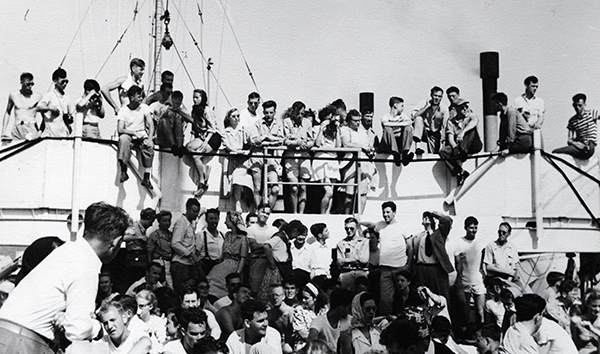Walking in the Footsteps of Our Predecessors
As we embark on the ISS’ 75th?session, which marks the start of our 75th?anniversary year, we have also looked to our 50th?anniversary for inspiration and guidance. We look to those who have gone before us when we do something new. At the outbreak of the pandemic last year, we made the decision not to cancel, but to change course radically within a few months’ time to provide a?digitalized?summer school for our students. It has become clear to us that we were then following in the very first footsteps of the ISS, which in 1947 was held for the first time in the midst of rebuilding the world after the Second World War’s period of global trauma and devastation. In 1947 and now in 2021, the ISS has stepped up to the plate to participate in rebuilding, and rebuilding with the ambition of creating a better world than the one we had. This was, we realized once we looked back at our choice to persist, always the way of the ISS.
 Young Americans, full of expectation, on The Marine Jumper on their way to Oslo in 1947. Photographer unknown/ MUV.
Young Americans, full of expectation, on The Marine Jumper on their way to Oslo in 1947. Photographer unknown/ MUV.
Rebuilding the World after a Global Crisis: From Idea to Praxis
Like today, the ISS struggled at its inception with?how, in a very practical sense, students might be brought together. In 1947, it was not immediately clear how one might set out to transport 200 American students to Norway for the summer, for at first the ISS was for American students only. In March, just a few months before the summer school was set to start for the first time, options included a Norwegian whaling vessel limited to men students and smelling strongly of whale-oil, or the Norwegian troop ship?Svalbard?then transporting Norwegian occupation troops to and from Germany. Following diplomatic efforts on both sides of the Atlantic, the converted former US troop carrier?Marine Jumper?transported the students, one of whom had already been aboard the vessel from New York to Marseilles as a World War II soldier. He had been astonished at the “luxurious” changes made from hundreds of hammocks to “actual bunks, beds and even sheets and pillow cases”. The parallels to our situation in 2021 are striking, although the solutions are very different.?It is in the ISS’ backbone to bring people together in innovative ways, in spite of hindrances!
Today, this challenge has been met not by bringing students to the classrooms in Norway, but by bringing the classrooms in Norway to them. By re-examining and re-purposing our international classroom pedagogics to a digital sphere, the ISS is continuing to be what we have always been by changing how we do it: Through employing measures such as a balance between synchronic and asynchronic teaching, the flipped classroom, and student activating techniques to recapture the benefits of an international classroom in a digital sphere. Just like in 1947, we last year had to plan against a backdrop of uncertainty. This year, we conduct our first digital anniversary celebration during a time when much has been cancelled and postponed.
"We Came as Strangers and Left as Friends"?
In 1947 the ISS was established as a project to show gratitude toward the US accommodation of Norwegian university students during and after World War II, and to promote international education exchange while conducting soft diplomacy. Although these students were all from the U.S., they represented 33 different states, a diverse range of university institutions, academic backgrounds and ages. There were almost as many women as men in the first group of students, which also included World War II veterans and African-American students. All students brought diverse academic and personal perspectives to share and shape the class of 1947.?

The Trans-Atlantic exchange expanded to include other nations throughout the first 10 years, and has always had a deliberate focus on diversity inspired by the sentiment at the founding of the EU: “If we know each other, how can we go to war against each other?” This was echoed by ISS alumni in the 1950’s: “We came as strangers, we left as friends”. The mission of the ISS is still just as relevant, and we continue to defy the obstacles of our time to bring students together.
In the Spirit of Knowing One Another
The international student body is diverse today in new ways, because we see that digitalization opens avenues of accessibility to students from a range of countries who for a variety of reasons have more obstacles than others to participate in person. The need for strengthening human bonds, solidarity and action across divides and injustices remains the same as before. As does the ISS’ mission for collective effort toward a better, common world. The key, the necessary condition for this effort, has been and continues to be forging personal connections between students in an academic context of goodwill.?
Our inspiring alumni continue to show us the impact of this mission, especially as we call on them to share with us and each other on our digital platforms for our 75th?anniversary celebrations lasting throughout 2021 and parts of 2022.
We welcome you all this year to the digital opening ceremony of our 75th?session, to our open-access webinars on Norwegian Life and Society, and to connect with us on our website and anniversary Facebook-group.
I look forward to seeing you there!
Nita Kapoor